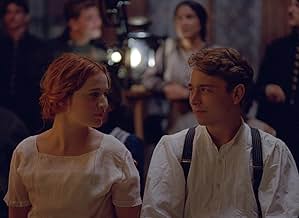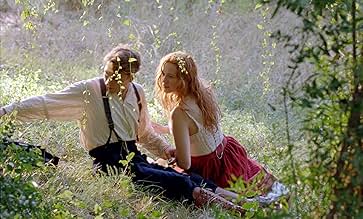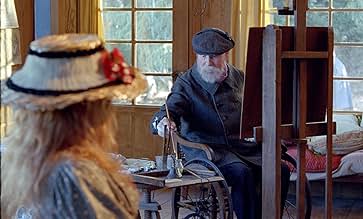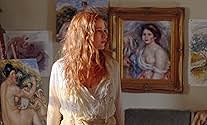Costa Azzurra, estate del 1915. Jean Renoir, figlio del pittore impressionista Pierre-Auguste, dopo essere stato ferito nella prima guerra mondiale, torna a casa con Andrée, una giovane che ... Leggi tuttoCosta Azzurra, estate del 1915. Jean Renoir, figlio del pittore impressionista Pierre-Auguste, dopo essere stato ferito nella prima guerra mondiale, torna a casa con Andrée, una giovane che ringiovanisce, incanta e ispira tutti e due.Costa Azzurra, estate del 1915. Jean Renoir, figlio del pittore impressionista Pierre-Auguste, dopo essere stato ferito nella prima guerra mondiale, torna a casa con Andrée, una giovane che ringiovanisce, incanta e ispira tutti e due.
- Regia
- Sceneggiatura
- Star
- Premi
- 3 vittorie e 11 candidature totali
- La boulangère
- (as Annelise Heimburger)
- Le brocanteur
- (as Thierry Hancisse de la Comédie Française)
- Servante Collettes
- (as Cecile Rittweger)
Recensioni in evidenza
Andrée is a free spirit. She has no problem posing in the nude, but she makes it clear to everyone that she is a paid model. She has no intention of posing for the honor of it, nor is she ready to become a cook or a maid, as have other models before her.
Naturally, Jean is drawn to the beautiful young woman, and the plot revolves around the relationships among and between the three main characters.
This is an extraordinarily beautiful movie, filmed on the scenic Côte d'Azur. War is raging elsewhere in France, but life is peaceful in this region. The pace of the film reflects the pace of life at the time--quiet and slow.
This is a film worth seeing, based on historical fact, and suggesting what motivated the younger Renoir to become the extraordinary film director that he was. For some reason, the IMDb weighted average of this film is a dismal 6.6. (The ratings themselves are much higher, but the weighting system brings the number down.) Don't be discouraged by the low rating. This is a movie worth seeking out and seeing. It will work better in a theater, but, if necessary, see it on DVD. It will repay your viewing.
While it's definitely not for those who strongly favor conventionally plotted drama or fast action, RENOIR consists of immediate realism and puts you right with the Renoir clan on the French Riviera. It's the sort of film that could easily have been made overly artsy and dull, but it's neither.
The entire story takes place in 1915, toward the end of Renoir's life. The relationship between model Andrée Heuschling and son Jean Renoir is, in many ways, more the subject of the story than the painter himself, yet Renoir himself is indispensable as "the boss," a sort of god-like backdrop to the entire cast and story. Having said that, I must add that there is a fair amount on Renoir's artistic processes, and his philosophizing can be applied to all sorts of art-forms as well as painting. One of RENOIR's strongest aspects is its portrayal of a man who is obsessed with his work and has one thing which utterly engulfs and consumes him.
Like many French films, RENOIR succeeds in breaking all sorts of rules. Among them:
--The plot is meandering and somewhat slice-of-life but still gripping;
--Andrée, the "girl from nowhere," and free but neglected youngest son Coco are characters that beg to be developed further, but at the same time, perhaps it's better that they remain mysterious;
--Lots of female nudity without it seeming the least bit gratuitous: After all, the subject is an artist who often painted naked girls;
--The mood is a successful mesh of somberness, poignancy, and (often laugh-out-loud) humor.
Just about every artsy cliché could be applied to this film, but suffice it to say that it is a beautiful experience. Even simple colors come alive here for the audience as they did for Renoir himself. I'm a word person who's never been a big painting aficionado, but this film made me see the visual arts in a whole new light and may even have converted me to some extent. The soundtrack--quiet, unobtrusive piano scores in the background--also does a great deal to carry this film.
So promising. And so beautiful without depth. See it if you love beautiful, patient (aka slow) movies. It's set in the French countryside during WWI, and is filled with loving scenes of the fields and woods and streams there, drenched in gorgeous light. And it is filled in wonderful interiors, day and night, including some lovemaking. And it is filled frank nudity, in the name of art.
You see, the main character, which should have been the name of the movie, is the model of the great Impressionist painter
But late Renoir compared to early Renoir—that is, late works by the painter compared to early works by the filmmaker—are no contest. One artist is checking out, and leering and relaxing. The other is striving and incomplete, entering a new medium and a new age. History might say that the father was more important overall, and I agree that some of his early paintings are monstrously perfect. But by the 20th Century, some 30 or 40 years after his heyday, it's another story, and his studies, many of them nudes, are weak and indefinite. I teach art history, which is no great claim, but I study and look at this stuff all the time, and late Renoir is to be avoided!
Not so early Renoir, the son, the film director. By 1939 Jean had made one of the truly great masterpieces of the period, in any medium: "Rules of the Game," as it's called in English. It gives away his own familiarity with the rich and cultured world of France before WWII. It gives away what he disdained about his upbringing, in fact, as he critiques it in the film, with a laugh and some true pathos. That's 20 years after what you see here, but this is a film site, and if you want to connect the dots, see that one.
But look, this isn't a documentary, it's a movie, a bio-pic in a way, lush as it is. And it's slow. It avoids actual depth and substitutes profound (and often touching) commentary. It resides in the color and light and smoke made during the filming, which isn't really the point—except for the flimmakers. In a way I'd say it conjurs up the time, in a precious and empty way, very well. No contradiction intended. It won several best costume awards.
But be prepared. If you love art and love Renoir, you'll be disappointed, in the end. (The paintings in the film were made by a notorious forger.) If you just love beautiful films to get lost in, this might do the trick. It's immersive. And it does remind us of the real depths of the original Impressionists and their love of light, and their love of life. That's the real point here. What is the true interest—the beginning of the son's film career, is left a footnote.
Lo sapevi?
- QuizOfficial submission of France to the Oscars 2014 best foreign language film category.
- BlooperWhen Pierre-Auguste walks in on Jean Renoir being bathed, a modern toggle-style light switch is visible on the wall. The toggle switch wasn't invented until 1917, which is a few years after that part of the film. Earlier light switches were push-button style, and the switch on the wall is also of a modern plastic style that is very much later.
- Citazioni
Pierre-Auguste Renoir: You're rather modest for an actress.
Andrée Heuschling: Actress doesn't mean whore.
- ConnessioniFeatured in Fandor: Cannes You Dig It? | Fandor Spotlight (2022)
- Colonne sonoreShimmy Dédée
By Patrick Artero
Performed by Patrick Artero, Philippe Baudouin, Francis Guero, André Neufert and Michel Queraud
I più visti
- How long is Renoir?Powered by Alexa
Dettagli
- Data di uscita
- Paese di origine
- Sito ufficiale
- Lingue
- Celebre anche come
- 印象雷諾瓦
- Luoghi delle riprese
- Aziende produttrici
- Vedi altri crediti dell’azienda su IMDbPro
Botteghino
- Lordo Stati Uniti e Canada
- 2.293.798 USD
- Fine settimana di apertura Stati Uniti e Canada
- 65.194 USD
- 31 mar 2013
- Lordo in tutto il mondo
- 7.816.573 USD
- Tempo di esecuzione
- 1h 51min(111 min)
- Colore
- Mix di suoni
- Proporzioni
- 1.85 : 1
































